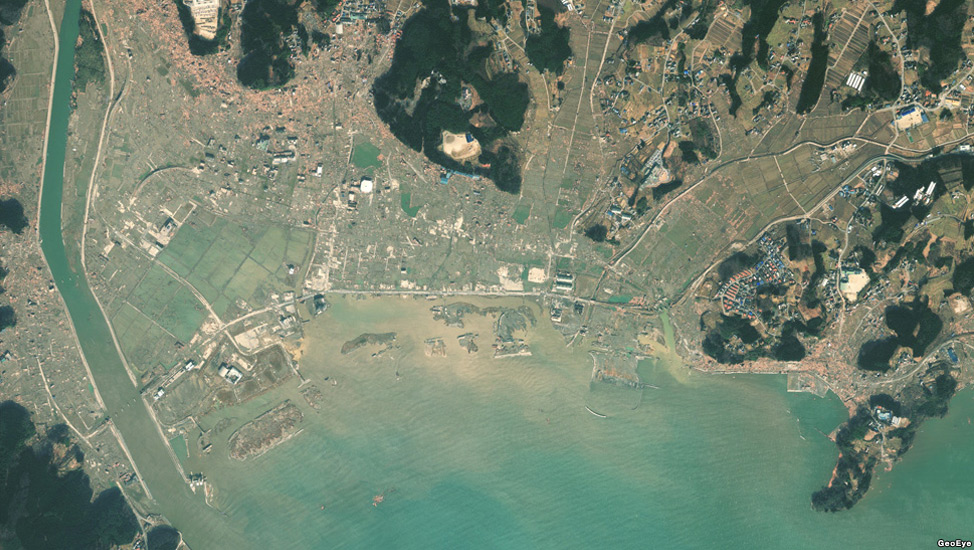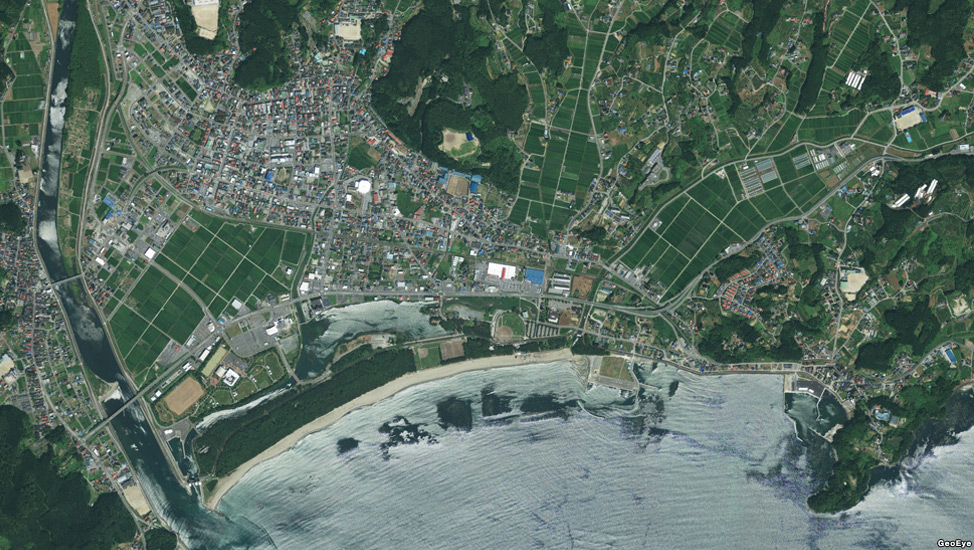Six months on: Japan tsunami survivor's story
 Chihiro says her swimming keeps her from dwelling on the memories of the tsunami
Chihiro says her swimming keeps her from dwelling on the memories of the tsunami
For a tsunami survivor the water, you would think, might be terrifying. But Chihiro Kanno launches herself into the swimming pool with a determined dive.
The 16-year-old is training with her high school swimming team. Six months ago she was caught in the tsunami, swallowed by the waves.
"It's true I survived the tsunami. I did experience it but it never crossed my mind that I would not be part of this swimming team. I'm not scared of the water," says Chihiro.
Chihiro's team were just starting a practice session at a pool near the seashore in their hometown of Rikuzentakata when the magnitude-9.0 earthquake struck on 11 March.
Following their normal evacuation drill the team headed to the town's community centre. But the building was swamped by the waves.
Chihiro was swept into a tiny storeroom. She clung to the hand of one friend trying to haul her to safety. But she could not hold on against the force of the water, and it tore the two girls apart.
Chihiro managed to survive, trapped in a tiny air pocket inside the building. Her friend, whose hand she had been clasping, was one of seven of her teammates who were swept away.
“Start Quote
End Quote Chihiro KannoI was underwater, my back touched the floor. Above me was wreckage. I dodged it and swam up. There was a small space between the ceiling and the water, I could breathe there.”
"When I am alone I cannot help thinking about my friends who died," says Chihiro softly, "I really long to see them again. But when I am with my friends I am fine."
Incredibly her swimming team has already recruited new members. But because almost everything in Rikuzentakata was destroyed they now have to travel almost two hours up the coast to another pool to train.
"I want to swim my best, for my teammates who lost their lives," Chihiro says. "There are only two of us from the second grade who survived. So now it's down to us to lead the new members."
Ghost townRikuzentakata was one of the towns worst hit by the tsunami. Today huge trucks rumble down the empty roads of what was the town centre, carting away rubble.
The place is a ghost town, overgrown with weeds and bushes. Among the only buildings standing are the giant Maia department store, the town hall, and the community centre - all gutted.
The debris that was strewn as far as the eye could see after the tsunami, the smashed cars, the twisted metal, has almost all been picked up. It is now in huge mountains down near the seashore.
 Men with mechanical shovels and diggers sort the wreckage for recycling
Men with mechanical shovels and diggers sort the wreckage for recycling
Men with mechanical shovels and diggers are hard at work there, sifting the wreckage into huge piles ready for recycling. There are mounds of car tyres, wood, metal and other waste. But there is absolutely no sign of reconstruction anywhere.
"The government has said it will give us funds for reconstruction, but we haven't received any money yet," says Futoshi Toba, the Mayor of Rikuzentakata.
"You have seen the city hall standing there, we need to tear it down and clear the land. We've been promised the cash, but in reality none has come. So we can't start anything at all."
The lack of money means he can't even clear the wrecked buildings, let alone start on new construction. So Mr Toba is deeply frustrated.
"Of course. And I am not the only one. The people of this region are the ones affected, and frustrated," he says. "The politicians in Tokyo are fighting among one another, ignoring us. I ask the politicians what are they doing sitting in Tokyo?"
By Rikuzentakata's seashore the waves are rolling in. The area used to be famous for its white sand beach, and massive pine forest. Now there is just a field of smashed up tree stumps and giant slabs of concrete from the broken sea walls.
Mr Toba believes the tsunami was 18m (60ft) high here. His plan is to rebuild the sea wall. He says it will need to be 15m high, and behind it earth will be brought in to raise the level of parts of the town by another 3m. But he says unless the central government commits to funding the project he can't go ahead.
The fear is that if reconstruction does not start soon communities all along this coast could slowly fade away.
Low expectationsEven before the tsunami, Rikuzentakata and the other fishing towns were slowly withering, the young people moving to the cities, leaving an ageing population and struggling industries.
 Chihiro's mother says she expects nothing of the Japanese government
Chihiro's mother says she expects nothing of the Japanese government
Since the tsunami, Rikuzentakata's population of almost 25,000 has fallen below 20,000. Some 1,550 of its citizens died, 200 are still missing, and another 2,000 have simply moved away, their jobs and livelihoods gone.
"If the politicians in Tokyo just imagined that they or their families were the ones affected, they would have no difficulty making decisions," says Mr Toba.
"If your child was left here with no job, nowhere to live, what does he need? Yes, a job, a house. Soon winter will come and we will have other problems."
What is impressive are the efforts that have been made to house the town's homeless. Dotted at sites across Rikuzentakata are groups of temporary steel buildings.
They are all spotlessly clean, neat and tidy. Some already have potted flowers outside. Workmen are busy making porches for each house. Every home has piped water and gas, even its own electricity meter and personal letter box. About 2,000 families are now living like this.
In their temporary home Chihiro's mother and father are busy preparing dinner. The family have a couple of small rooms and a kitchen area, a television, cooker, table and pictures on the walls.
Chihiro's father has lost his oyster fishing business. Her grandfather is one of those still missing, presumed dead. Her mother says the family long to be able to find his body to give him a proper burial.
They also want to know whether they can rebuild their own house. So they too are waiting for decisions from Tokyo.
"What do I think about the government?" she asks, then laughs incredulously. "Not much. Our politicians have been fighting over who should be prime minister. This is not a time for that. We've come to expect nothing from them."
Every morning Chihiro travels an hour up the coast to a temporary school. She is with her friends there. But what she really wants, she says, is a new school and new home in Rikuzentakata.
In the meantime it is her swimming that keeps her from dwelling on the memories of the tsunami.
"When I am swimming, my friends are with me, we train hard together. I don't have to think about anything. I just empty my mind. That's why I like it so much."
Below: Images of Rikuzentakata before and after the 11 March tsunami
The enhanced functionality requires Javascript to be enable on your browser


~RS~q~RS~~RS~z~RS~30~RS~)

 Australia shock at asylum tragedy
Australia shock at asylum tragedy